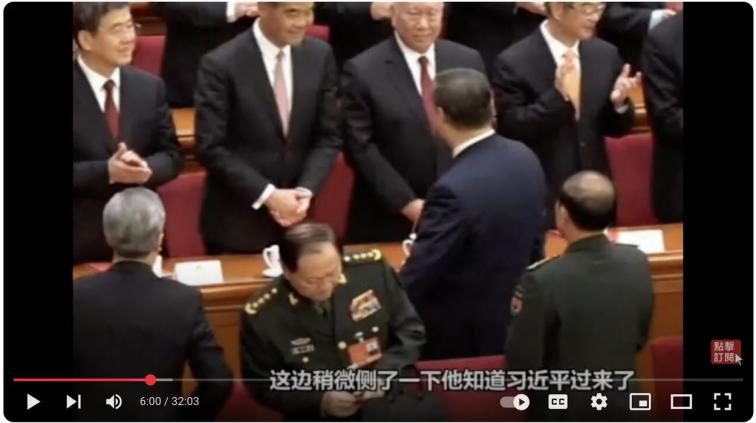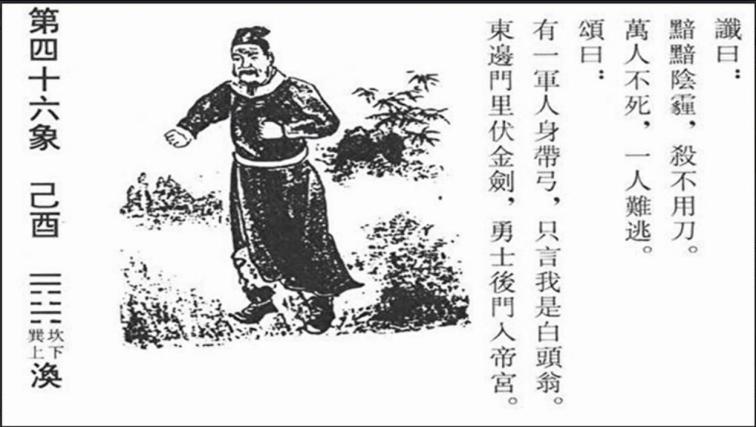Photo: Tiananmen Square under heavy clouds. (Lintao Zhang/Getty Images)
[People News] This afternoon (23rd), the Fourth Plenary Session of the Communist Party of China, which has squandered public resources, concluded amid formality and deception. The party's media did not cover the closing ceremony but instead issued a communiqué from the plenary session, revealing significant personnel changes among the central committee members. Contrary to rumours, the position of the party leader remained unchanged; however, Zhang Shengmin was appointed as vice chairman of the Military Commission. Additionally, 11 alternate central committee members were promoted to full members, a number of alternate members were replenished, and the expulsion of 14 individuals from the party was confirmed, including a previously unannounced general from the military. The communiqué also outlined the main objectives for economic and social development during the '14th Five-Year Plan' period, emphasising reliance on technological advancement and the establishment of an industrial system, among other initiatives. Analysts noted that Zhang Shengmin's promotion—who serves as the deputy secretary of the Central Commission for Discipline Inspection, secretary of the Military Commission's Discipline Inspection Commission, and director of the Military Commission's Supervisory Commission—signals an intensification of purges within the military, leading to more persistent and fierce internal conflicts.
At 16:56 on October 23, the Communist Party's official media outlet, Xinhua News Agency, released a communiqué from the Fourth Plenary Session, stating that 168 central committee members and 147 alternate central committee members attended the session. The meeting approved the so-called '14th Five-Year Plan' proposal. Following a wave of enthusiastic praise for the party's achievements, it presented a utopian, communist-style illusion for 2035.
Subsequently, it was announced that the plenary session had decided to appoint Zhang Shengmin as the Vice Chairman of the Central Military Commission and to replace the alternate members of the Central Committee: Yu Huiwen, Ma Hancheng, Wang Jian, Wang Xi, Wang Yonghong, Wang Tingkai, Wang Xinwei, Wei Tao, Deng Yiwu, Deng Xiuming, and Lu Hong with full members of the Central Committee. Finally, it was bluntly stated that the plenary session reviewed and approved the examination report concerning the serious disciplinary and legal violations of Tang Ranjian, Jin Xiangjun, Li Shisong, Yang Fasen, and Zhu Zhizong, confirming the expulsion from the Party of He Weidong, Miao Hua, Tang Ranjian, Jin Xiangjun, He Hongjun, Wang Xiubin, Lin Xiangyang, Qin Shutong, Yuan Huazhi, Wang Chunning, Li Shisong, Yang Fasen, Zhu Zhizong, and Zhang Fengzhong.
Among those mentioned, Zhang Fengzhong serves as the Director of the Political Work Department of the Rocket Force and holds the rank of Major General. He is an alternate member of the 20th Central Committee. Previously, the Communist Party of China (CPC) had not publicly announced any investigation into him, making this the first disclosure of his fall from grace.
A comparison with the list of alternate members of the 20th Central Committee reveals that several individuals were skipped in the replacement process, including Major General Wang Liyan, Deputy Commander of the Rocket Force, Major General Wang Kangping, Commander of the Joint Logistics Support Force, Wang Jiayi, Deputy Minister of Education, and Major General Fang Yongxiang, Director of the Office of the Central Military Commission. According to CPC regulations, those who are skipped may have already encountered problems. Among these individuals is Major General Shi Zhenglu, Commander of the Northern Theatre Army, who was previously reported by foreign media and social platforms.
Rumours regarding CPC leader Xi Jinping's 'loss of power' had circulated widely, and various versions of changes within the Military Commission emerged. However, the CPC's official announcement indicates that these rumours were unfounded, which also corroborates the author's analysis from yesterday.
This suggests that either the various factions and forces within the Communist Party of China (CPC) have reached a balance, or that the vested interest groups are reluctant to publicly fracture the party in order to preserve it. Alternatively, it may also indicate that Xi Jinping's consolidation of power is still ongoing. Current affairs commentator Li Linyi noted that it may not be until the 21st National Congress that the internal power struggle has further potential for escalation. The significant collapse of the Central Committee indicates that this regime is facing an unprecedented crisis.
Rumours that Wang Yang or Hu Chunhua might be positioned as successors for the 21st National Congress have not come to fruition. According to protocol, if Xi Jinping is to relinquish the role of General Secretary and military authority at the 21st National Congress in two years, the successor must be appointed as Vice Chairman of the Central Military Commission at this meeting, while also serving as Vice President of the country to gain familiarity with the responsibilities. However, no such arrangements were evident at this plenary session. Zhang Shengmin has been appointed as Vice Chairman of the Central Military Commission, but he lacks experience in party governance and local administration, making him an unlikely candidate for the General Secretary's successor.
Political analysts suggest that Xi Jinping is grappling with a dilemma commonly faced by long-serving authoritarian leaders: designating a successor could create a rival power centre that undermines his authority; yet, if he fails to establish a successor, it could threaten his political legacy and foster divisions within the upper ranks of the CPC.
As the CPC embarks on its "anti-corruption campaign," the number of Central Committee members confirmed to have fallen from grace during the Fourth Plenary Session has reached a record high. This not only highlights Xi Jinping's inability to identify and appoint capable individuals but also signals the failure of his anti-corruption efforts, further demonstrating that the current system is a breeding ground for corruption. The CPC appears unable to identify a successor, which may align with Xi Jinping's covert ambition for an indefinite term.
However, can this be achieved? The large-scale movements of the Communist Party's military, the worsening domestic and international economic and political conditions, the changing public sentiment, and Xi Jinping's health are all uncertain factors. If any one of these leads to a black swan or grey rhino event, the fate of the Chinese Communist Party will remain uncertain, without needing to reference the domestic and international conflicts that have historically led to the downfall of every dynasty in China. Ultimately, we will have to wait and see how things develop over the next year or two.
(First published by the People News)
△











News magazine bootstrap themes!
I like this themes, fast loading and look profesional
Thank you Carlos!
You're welcome!
Please support me with give positive rating!
Yes Sure!